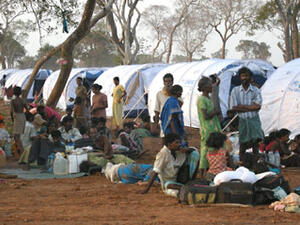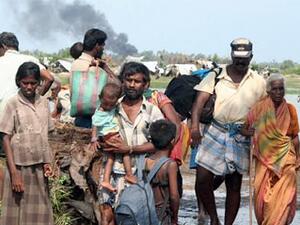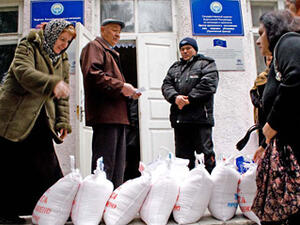Feature: Stranded in Pakistan after the September 11 attacks
Feature: Stranded in Pakistan after the September 11 attacks

Even though over 1.6 million people have returned home to Afghanistan since March, repatriation is still not an option for some.
ISLAMABAD, Pakistan (UNHCR) - The day that hijacked airliners slammed into New York and Washington, D.C., Mohammad Sadiq Mir was in Pakistan making final preparations for his family's departure the next afternoon to start a new life in the United States. One year later, they are still waiting, unintended casualties of the attacks and the US war on terrorism.
Mohammad's family never boarded their flight from Islamabad to Karachi, where they were to be among 277 refugees accepted for resettlement in the US travelling on a direct flight to New York. Along with those on other flights scheduled to leave last September - about 800 refugees, almost all Afghans - they were told no one would be admitted to the US until new, tighter procedures were in place.
"I don't know what is happening. I have been waiting for a year with six children and a wife," Mohammad said in Islamabad, where the family was placed this year because of fears for their safety because he is a convert from Islam. "I can't do anything, the children are not in school and I don't feel secure. I am told my case will be processed and that 100 or 200 others are also waiting."
When new procedures finally appeared early this year, they included intensive investigations of all men between the ages of 16 and 50. The approval of refugees, even those originally cleared prior to September 11, now takes far longer than the previous period of three months. A new rule limiting the number of refugees who can arrive in the US on one plane to 35 people, instead of the hundreds previously, has complicated planning.
A year after the devastating attacks on the US, about 80 refugees who had been scheduled to leave last September are still in Pakistan. Including fresh applicants this year, by the end of August 2002, 1,098 refugees proposed by UNHCR Pakistan and accepted by the US for resettlement were still awaiting permission to fly.
The September 2001 attacks also caused the US to reduce the total it could accept due to new procedures that slowed processing. From a target of 7,000 Afghan refugees it planned to resettle in the year starting October 1, 2001, the number was reduced to 1,500 following consultations in Islamabad with UNHCR staff. It is most unlikely that even the reduced quota will arrive in the US. If one includes the number other countries have agreed to take - 400 by Canada, 400 by Australia, 50 by Norway, 50 by Chile and 100 by other countries - the maximum that could be resettled this year from Pakistan is 2,500.
While the goal of the UN refugee agency is to return refugees to their country of origin, there are almost always some who can never go home. Cases in Pakistan include people of various nationalities who are likely to face problems such as political persecution if they return. Even with the defeat of the Taliban, some Afghans would still not be safe in their country.
Mohammad, 45, faces danger because his family of three sons and three daughters has converted from Islam. Even under the Soviet-installed communist government in Afghanistan, proselytising was illegal. His sister and her husband were attacked and killed in Kabul in 2001. Mohammad himself fled Kabul in 1988 after he was tipped off that he was about to be arrested.
After Mohammad and his family were beaten in Peshawar in June 2001, UNHCR moved the family to Islamabad and rented an apartment where they are cautioned to maintain a low profile. They are given a monthly allowance because work is impossible.
Adila Aziz, who was to depart with her five children from Islamabad for New York 24 hours after the attacks on the US, is an example of another group that needs resettlement - vulnerable women.
Adila, 41, was a teacher in Kabul until the Taliban captured the Afghan capital in 1996 and confined women to their homes. Her husband, a career officer who had graduated from the Military University, went to work one morning in 1997 and never came home. He had been hit by one of the rockets that were fired at random into the city over a 20-year period.
Even with the demise of the Taliban, UNHCR believes a woman with no male relative to assist her in Kabul would be at risk. An American organisation is still waiting in Illinois to help Adila and her family integrate into the US - if or when they finally get clearance to go.
Adila, who received a 12th grade education - high by the norms of Afghanistan - is driven by a desire to see her children educated. In Pakistan, the family survives on what the two eldest boys make selling vegetables. There is not enough money for any of her children to continue the schooling they began in Afghanistan.
"There are people who had interviews at the same time and they are long gone," said her 19-year-old son Ajmal, who speaks English learned in a Kabul school before his father was killed. "I always ask why, but we are told, 'Just wait, it is not in our hands.'"
By Jack Redden
UNHCR Islamabad









